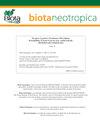生物多样性和公共卫生界面
IF 1.2
4区 环境科学与生态学
Q3 BIODIVERSITY CONSERVATION
引用次数: 2
摘要
除了现代化之外,人类活动已成为全球环境风险的关键因素,世界范围内的人为改变是野生动物和家畜甚至人类出现疾病的原因。特别是,一些新发传染病(EID)的空间分布和发病率的增加与森林砍伐和全球气候变化直接相关。此外,在过去30年里,已经报道了SARS-COV-2等新的EID病原体的出现。另一方面,生物多样性已被证明是生态系统健康的关键指标,并对增加促进人类公共健康发挥作用。在新热带地区,特别是在巴西,已证明几种传染病直接受到生物多样性丧失的影响,如疟疾、汉坦病毒肺综合征、黄热病、城市虫媒病毒、斑疹热等。为了更好地了解控制传染病的生态系统能力,FAPESP BIOTA项目支持研究人员和研究项目,以增加对巴西生物多样性和生态系统的认识,例如鸟类生物剂的多样性、有毒动物的多样性、城市地区森林斑块中蚊子物种的多样性、黄热病病毒在零散森林地区的传播、生态走廊的丧失以及斑疹热和疟疾的发生等。值得注意的是,FAPESP BIOTA是一个成功的方案,必须作为当前和未来促进公共卫生的重要工具加以扩大。本文章由计算机程序翻译,如有差异,请以英文原文为准。
Biodiversity and public health interface
Abstract Alongside modernity, the human activity has been a key factor in global environmental risks, with worldwide anthropic modification being the cause of the emergence of diseases for wild and livestock animals, and even humans. In special, the increase in the spatial distribution and in the incidence of some emerging infectious diseases (EID) are directly associated to deforestation and global climate changes. Moreover, the arise of new EID agents, such as the SARS-COV-2 have been reported for the last 30 years. On the other hand, biodiversity has been shown to be a key indicator for ecosystem health, and to pose a role to increase the promotion of human public health. In neotropical regions, and in special, in Brazil, several infectious diseases have been demonstrated to be directly affected for the biodiversity loss, such as malaria, hantavirus pulmonary syndrome, yellow fever, urban arboviruses, spotted fever, amongst other. To better understand the ecosystem capacity of regulation of infectious diseases, FAPESP BIOTA program have supported researchers and research projects to increase knowledge about Brazilian biodiversity and the ecosystems, such as diversity of bird bioagents, venomous animals biodiversity, diversity of mosquitos species in forest patches inside urban areas, propagation of the yellow fever virus over fragmented forest territories, loss of ecological corridors and occurrence of spotted fever and malaria, amongst others. It is noteworthy that FAPESP BIOTA is a successful program and must be expanded as an important tool for present and future public health promotion.
求助全文
通过发布文献求助,成功后即可免费获取论文全文。
去求助
来源期刊

Biota Neotropica
BIODIVERSITY CONSERVATION-
CiteScore
2.90
自引率
16.70%
发文量
0
审稿时长
4-8 weeks
期刊介绍:
BIOTA NEOTROPICA is an electronic, peer-reviewed journal edited by the Program BIOTA/FAPESP: The Virtual Institute of Biodiversity. This journal"s aim is to disseminate the results of original research work, associated or not to the program, concerned with characterization, conservation and sustainable use of biodiversity within the Neotropical region.
Manuscripts are considered on the understanding that their content has not appeared, or will not be submitted, elsewhere in substantially the same form, because once published their copyrights are transferred to BIOTA NEOTROPICA as established in the Copyright Transfer Agreement signed by the author(s).
 求助内容:
求助内容: 应助结果提醒方式:
应助结果提醒方式:


